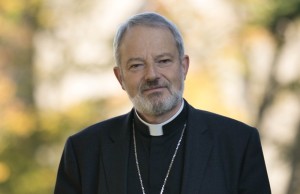
By Sarah Mac Donald - 15 May, 2016

Bishop Kevin Doran, bishop of Elphin
Efforts to repeal the 8th Amendment are not about ironing out a few minor legal difficulties, but opening the door to a liberalisation of abortion which is not consistent with the truth about the human person, Bishop Kevin Doran has warned.
In his homily at a Mass in Knock for the annual pilgrimage of the Irish Guild of Catholic Nurses & Irish Catholic Doctors Association last weekend, the Bishop of Elphin said the idea of referring the issue to a citizen’s convention was simply an attempt to distance the government from whatever is recommended.
“Some of your colleagues are speaking about unborn children with life-limiting conditions, as if their lives were useless; as if they were already dead,” Bishop Doran noted and added, “I think it will be especially important for Catholic doctors and nurses, who know the truth, to help people to recognise that babies with life limiting conditions are patients in need of care.”
Other challenges for Catholic healthcare professionals include the provision of chaplaincy services.
Dr Doran said that the focus on so-called generic chaplaincy undermines the right of every person, of whatever religious persuasion, to be offered spiritual support in a manner which is consistent with his or her faith. Equality, surely, is not about the lowest common denominator.
Recognising that technology is at the heart of advances in healthcare, as it is in every sector of society, the Bishop acknowledged that society needs to invest in technology but added that it also needs to invest in people.
“I know that many doctors and nurses feel undervalued and, as carers, have little sense of being cared for. I think this is a particular challenge for healthcare professionals who see themselves as following in the footsteps of Christ. We cannot wait for systems and structures to provide care. We need to look after one another,” he said.
Elsewhere in his homily, Bishop Doran spoke about the important identity of Catholic healthcare professionals who he said “are not just nurses and doctors who happen to be Catholic.”
“What defines you as Catholic healthcare professionals is that you see all those who are involved in the healthcare relationship – colleagues, patients and the relatives of patients – as people who have also been invited by the Creator to share a relationship with Him, a relationship which is the source of meaning and hope for everyone.”
“Being in right relationship with the Lord is integrally related to our acceptance of one another as brothers and sisters who have received the same open invitation.”
The Bishop of Elphin also underlined that the Hippocratic Oath pre-dates Christianity.
“The ethics of healthcare, with its focus on respect for human life, was always about seeking what was good and true and applying it to the science of healthcare. In more recent centuries, unfortunately, science has tended to focus more on what is possible or potentially ‘useful’.”
“Questions about what is good, if they are asked at all, often seem to come when the essential decisions have already been made. When we talk about a Catholic approach to healthcare, what we mean is that, for those who care for the sick, the words of Jesus: “whatever you do (or fail to do) for the least of these my brothers and sisters, you do (or fail to do) for me”, have a particular resonance.”
“But there are not two kinds of goodness, a Catholic goodness and an ordinary goodness. Good healthcare is good for people, full stop. The difference is that faith sharpens our perception of what our common humanity calls us to do and to be.”
He stressed that “An ethos which is informed by faith should not be about controlling or defining other people” and acknowledged that unfortunately a Catholic ethos is sometimes seen in that way.
“Whether you work in general practice or in a large public hospital, your Catholic ethos is simply about adhering to and proposing a vision of the dignity and worth of the human person which is inspired by the Gospel. What we do flows from who we are as disciples of Jesus Christ and reflects his desire to heal all who came to him.”
“Among our colleagues these days, there is great diversity. Many who are Catholic do not allow their faith to influence their professional lives. Some of them may be actually hostile to faith, but others have simply not made the connection between faith and life. On the other hand, many of your colleagues these days are not Catholic or Christian, but they are sincere believers, whose ethos of respect for life is very similar to ours.”
“All of this suggests to me that, in exercising our mission as Christian healers, we should be on the lookout for people like Apollos with whom we share common ground and we should be open to seeing ourselves in the role of Priscilla and Aquila, as people who are not just committed to living our own faith in action, but ready to share our vision with others.”